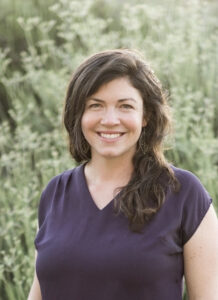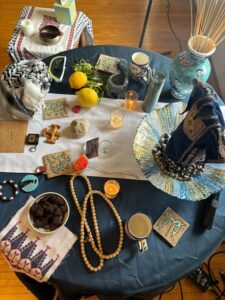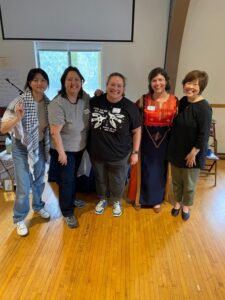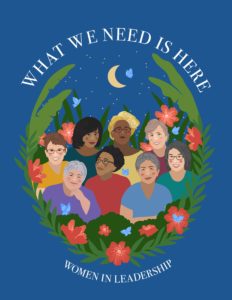
Pastor Katerina Gea shares about the Community Care and Trauma Healing gatherings her church has been hosting to support Palestinian solidarity.
Katerina Gea is the pastor of Pasadena Mennonite Church and is a member of the Women in Leadership Steering Committee and the Pastoral Committee of Mennonite Action. She loves poetry, gardening and dancing salsa. She lives with her spouse in Pasadena, in the Hahamongna band of Tongva peoples’ unceded territory.
__________________
Earlier this month, women healers in our church community brought together our collective power to share compassionate care with ourselves and our neighbors, in partnership with a Palestinian therapist named Marianne Albina. I met Marianne at the weekly Monday night vigils for Palestinian justice that members of our church community initiated with interfaith neighbors last October, held outside of our Congressional Representative, Judy Chu’s, office. These vigils have grown to include Palestinians, local student groups, members of Jewish Voice for Peace and many others. They have been deeply transformative, as we build relationships, pray and grieve together, and advocate for a just peace and end to the Israeli occupation of Palestine.

The community altar for Community Care and Trauma Healing gathering for Palestinian solidarity. Photo provided by Katerina Gea.
After nearly a year of marches, prayers, organizing, and calls for a permanent ceasefire and arms embargo on further weapons shipments from our government, I saw that people involved in these Monday night vigils — and in the wider movement — were hitting a wall of burnout and exhaustion, as Israel’s genocide in Gaza continued, despite our movement’s efforts. I especially felt grieved at heart for Palestinians in our midst, who are so far from home and, yet, witness the genocide of their people on TV and endure trauma, as our elected officials remain silent. Palestinian friends have shared with me about their struggles with sleeplessness, emotional numbness, and bodily aches and pains that weren’t there before. One friend, who is a surgeon in a nearby hospital, said that he has had to put down his instruments at times, since his hands were shaking so badly in fear and anxiety for his family trapped in Gaza.
I felt that, as a pastor with access to power, I needed to do something more. And as a pregnant woman, I needed to do something more to cherish and protect life, as children are being massacred. I took stock of the resources we had at hand: a church building space that we rent, an energized congregation committed to faith in action, volunteer time, and access to funding and grants for missional engagement. I approached Marianne to ask if Pasadena Mennonite Church could serve as a potential space for healing and rest for traumatized Palestinians, activists and allies. Marianne began to imagine what community care for one another might involve and called on her community of therapists and friends in amazing ways.
Since then, we have hosted two “Community Care and Trauma Healing” gatherings, on Sundays after our church services, for about 50 people, which included tables spread with hummus, pita and delicious Mediterranean food; large group reflection times; one-on-one sessions with volunteer therapists; yoga; somatic healing exercises; breath meditations; and Palestinian Dabkeh dancing, as a joyous way to close!
These gatherings create a sanctuary for diverse Muslim, Jewish, Christian and other neighbors of faith, or no faith, to find nourishment in community, and to breathe, rest, laugh and cry with one another in the midst of intense grief.
One of the Palestinians who came to our most recent gathering arrived in the U.S. last September, as a student from Gaza. Soon after his arrival, the Hamas attacks of October 7 happened, followed immediately by retaliation from Israel. Since then, he has lost over 60 family members, killed by Israel’s bombing campaign, and most recently, he lost his 1-year-old nephew. This is a tragically common story that I hear from those from Gaza. He shared that he has trouble sleeping, often wakes up with nosebleeds and has been to the hospital for severe anxiety many times over the last year. After he came to the gathering, he told Marianne that the time with others helped him find distance from extreme hopelessness. There are survivors of war and genocide, like this young man, close to home, and I believe our church communities can step out more boldly on the frontlines to offer our compassionate care, community resources and healing capacities for our traumatized and wounded siblings in our midst, even as we pray, resist and protest.

Some of the women organizers of the event: Lynn Hur, Marianne, Allie Davalos, Katerina Gea, and Sue Park-Hur. Photo provided by Katerina Gea.
The organizing team from our church for these gatherings is made up of all women, including therapists, a church leader trained in trauma healing, a student activist, a spiritual director and myself, a pastor. Others in the church have helped with logistics and set-up, but the driving power and vision for creating a healing space has come from a dream-team of women, guided by Marianne. I can only imagine that this is because our church structures are open enough that women can easily step into leadership to offer our gifts, tap into our God-given power and share that amazing life force, with love for the healing and wellbeing of our wider community. I take this for granted sometimes, as a woman pastor in a congregation supportive of women in leadership, but I know that not all church structures allow for this freedom in the spirit to respond to the needs of others and share in Jesus’ healing ministry with our neighbors.
That brings me to a final invitation: We need spaces for collective care, as women in the church, where we can support one another, as we seek to share our power as healers, visionaries and leaders in the church. As a member of the Women in Leadership steering committee, I’m excited that we can offer the Women in Leadership Summit, a day-long gathering on July 8, 2025, before MC USA’s Follow Jesus ‘25 convention begins. This will be our first in-person gathering since the COVID-19 pandemic!
The Summit’s theme will be “Beholding it Together,” with the description: “We come together. To be. To be known. To behold. We listen to each other’s stories, each other’s souls, and bear witness to our power.” It promises to be a time of deepening support and networks for Mennonite women in diverse leadership roles, offering spaces for rest and community care, as well as deep discussions around power and the diverse struggles we face as women leaders. We hope you can join us! Stay tuned for more information on the Women in Leadership website.
If you are able to donate to those in Gaza impacted by genocide, here are the fundraising sites for two people in our community: Atta’s GoFundMe page and Ahmad’s GoFundMe page

MC USA’s Women in Leadership (WIL) works to dismantle patriarchal systems in Mennonite Church USA by empowering women to live out the call of God on their lives, increase their capacities, and contribute their wisdom in congregations, area conferences, agencies and institutions.

